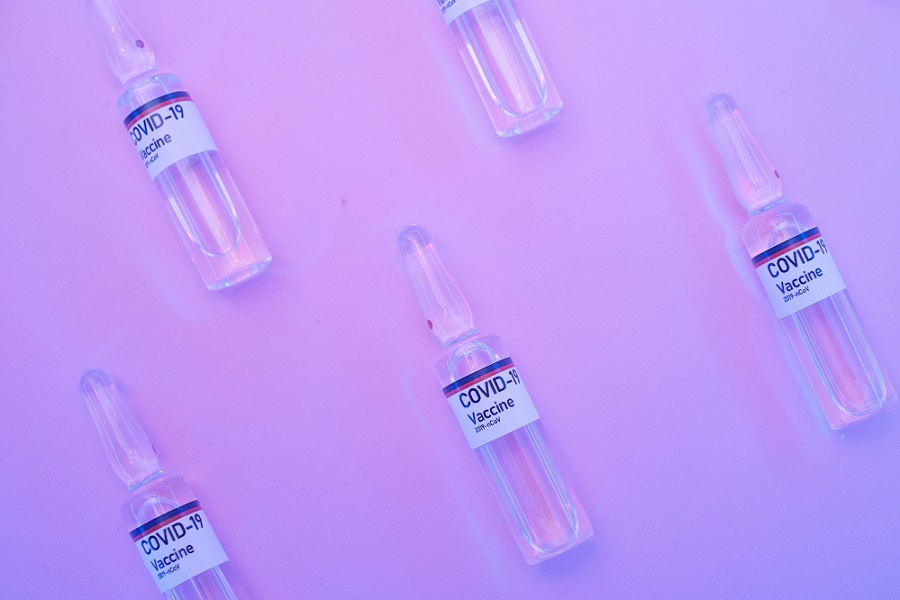New study to test third Covid-19 vaccine for people with weakened immune systems
Published: 21 September 2021
 Photo by Alena Shekhovtcova from Pexels
Photo by Alena Shekhovtcova from Pexels
Following the recent announcement by the Joint Committee of Vaccination and Immunisation (JCVI) that people who are immunosuppressed will be offered a third Covid-19 jab, a new clinical trial will begin at St George’s to determine whether a third dose of vaccine will improve the immune response for people in these groups.
The trial will be led by the University of Glasgow and co-ordinated by the University of Birmingham’s Cancer Research UK Clinical Trials Unit, with St George’s Hospital acting as a site for the trial, with support from the Vaccine Institute at St George’s, University of London. The Principal Investigator for the study at St George’s will be Dr Mickey Koh, Lead for Haematology at the hospital and an Honorary Senior Lecturer at the university.
The OCTAVE DUO study will offer people who are immunosuppressed or immunocompromised an additional vaccine to determine whether this will give a stronger immune response than two doses.
The study follows on from the OCTAVE trial, which was set up to assess the immune responses in immunosuppressed patients after receiving their first two Covid-19 vaccine doses. The preliminary results from OCTAVE, published in The Lancet, demonstrated that although some antibodies were detected in 89% of people who are immunocompromised or immunosuppressed following vaccination, as many as 40% of people in these groups mounted a low, or undetectable, immune response after two doses. It was also felt that this figure is likely to be significantly higher in certain groups of immune suppressed patients like those who have recently received a bone marrow transplant.
The level of antibodies required for protection from Covid-19 is still not known, and it is likely that other immune cells called T cells also play an important role in protecting people from the virus. Nonetheless, these findings suggest vaccine efficacy is likely to wane more quickly in these groups and that the current two vaccine doses may not be sufficient.
With this in mind, up to 1,200 patients who are already involved in the OCTAVE study or those with other at-risk conditions involved in parallel studies will be recruited to the OCTAVE DUO trial.
Co-funded by the government’s Vaccines Taskforce and UK Research and Innovation (UKRI), the study will analyse in detail the immune response of this group to the vaccine and the durability of this protection. It will also use healthcare records to determine whether any participants are later diagnosed with Covid-19.
Initial results are expected later this year to further inform the UK’s Covid-19 vaccine deployment in these specific at-risk groups. The trial will follow the patients to mid-2022 and offer more detailed information at that stage about the immune responses that develop in these groups.
Speaking on the trial, Dr Koh said: “I think the promise of these two trials is that, together, the findings will allow us to have a deeper and clearer understanding of how vaccination impacts upon immune response, especially in immune suppressed patients with cancers, on dialysis or post-transplant. This will extend our knowledge beyond not just healthy individuals, but to those that are at greater risk of contracting very severe Covid-19 disease.
“We’ve seen from the initial wave of Covid-19 how severely impacted these patients are. It’s very important that we continue to look after these groups as best we can and find the optimal timing and delivery of vaccines they should have.”
Patients included in the OCTAVE DUO study are people with immune mediated inflammatory diseases (including rheumatoid arthritis, psoriatic arthritis, vasculitis and inflammatory bowel disease), renal disease, certain cancers, stem-cell transplantation, and other immune deficiencies.
Professor Pam Kearns, Director of the University of Birmingham’s Cancer Research UK Clinical Trials Unit, which is co-ordinating both OCTAVE and OCTAVE DUO, said: “The pandemic has been particularly concerning for millions of people in the UK who have conditions or long term illnesses which place them at greater risk of severe illness and death from COVID-19.
“Together with our preliminary findings from OCTAVE, this new study will be instrumental in helping inform how best to vaccinate patients with chronic conditions, and protect them from COVID-19 infection in the future.”
Recruitment to the OCTAVE DUO study will mainly be from the cohort of people involved in the initial OCTAVE study, and similar studies. More information can be found on the trial website.